Module 5 My school day Unit 3 Language in use.课件(共20张PPT)
文档属性
| 名称 | Module 5 My school day Unit 3 Language in use.课件(共20张PPT) |
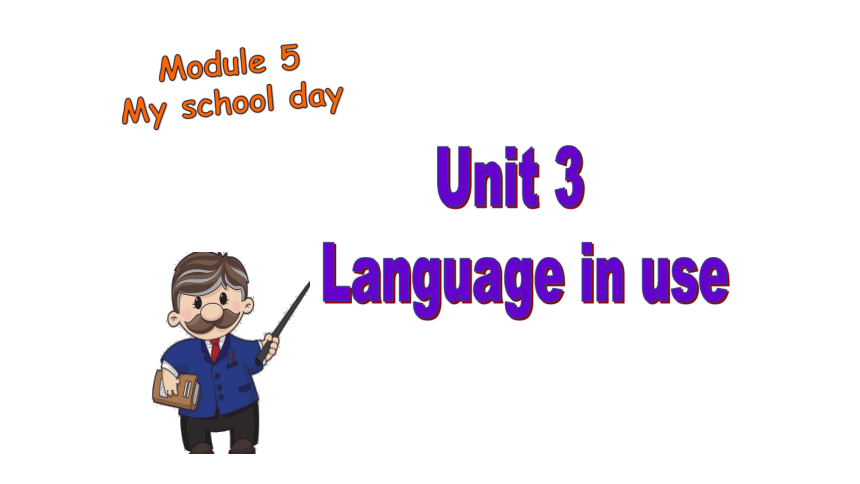
|
|
| 格式 | pptx | ||
| 文件大小 | 1.5MB | ||
| 资源类型 | 教案 | ||
| 版本资源 | 外研版 | ||
| 科目 | 英语 | ||
| 更新时间 | 2022-06-04 00:00:00 | ||
图片预览

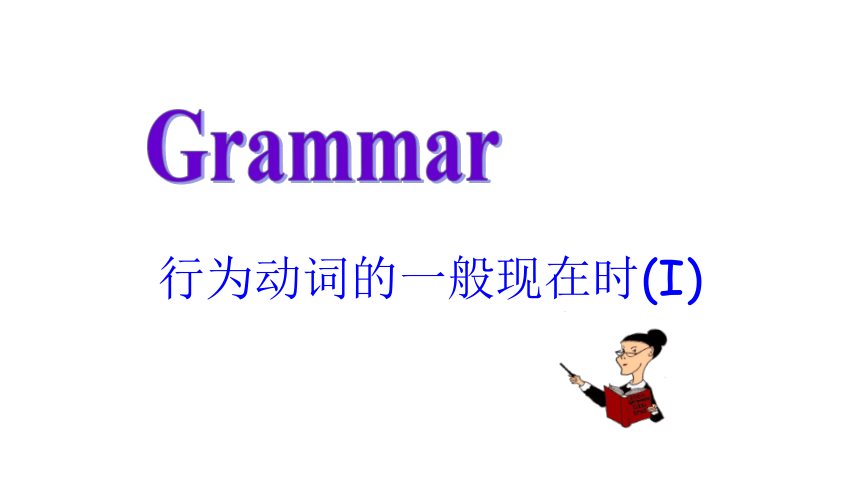
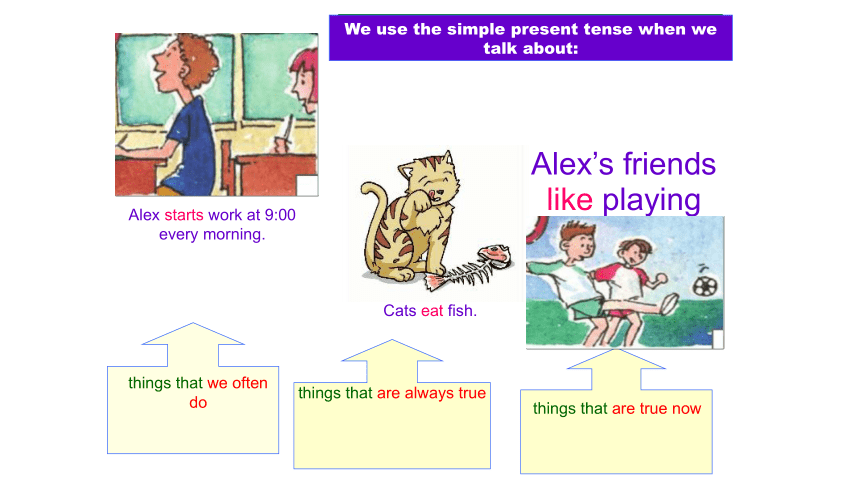
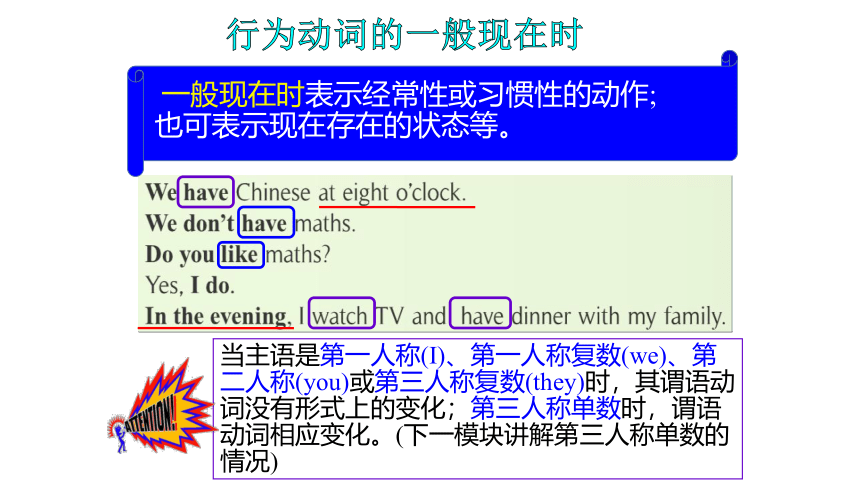
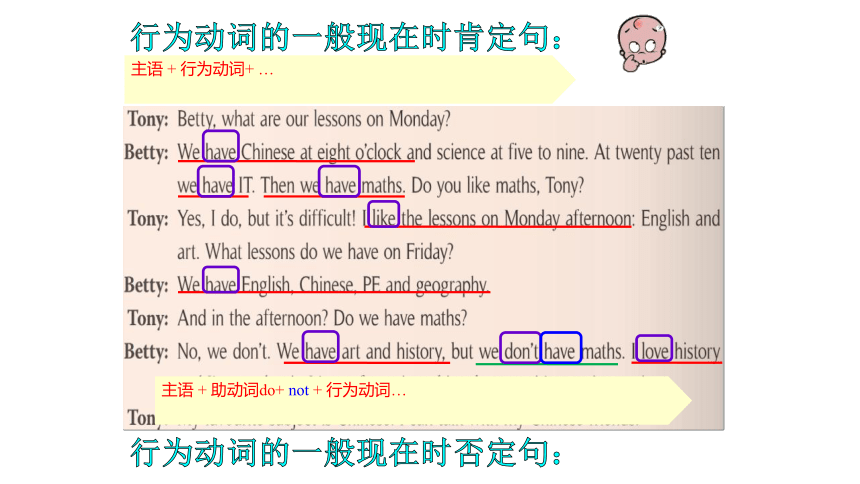
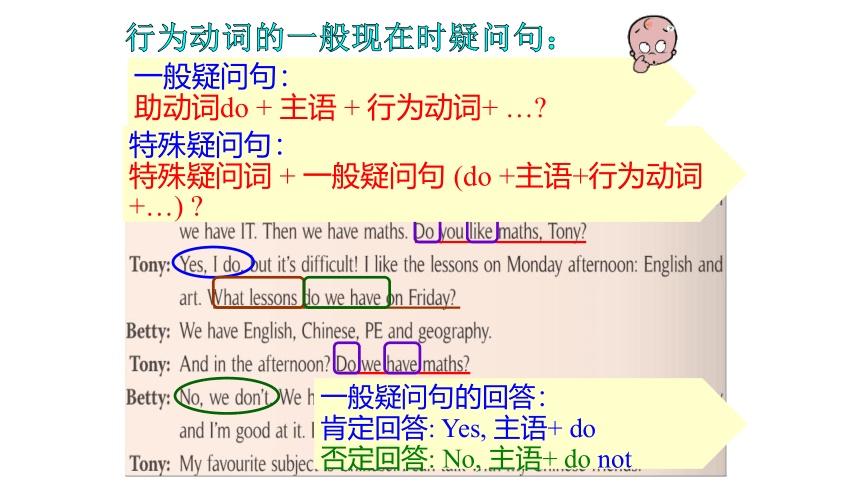
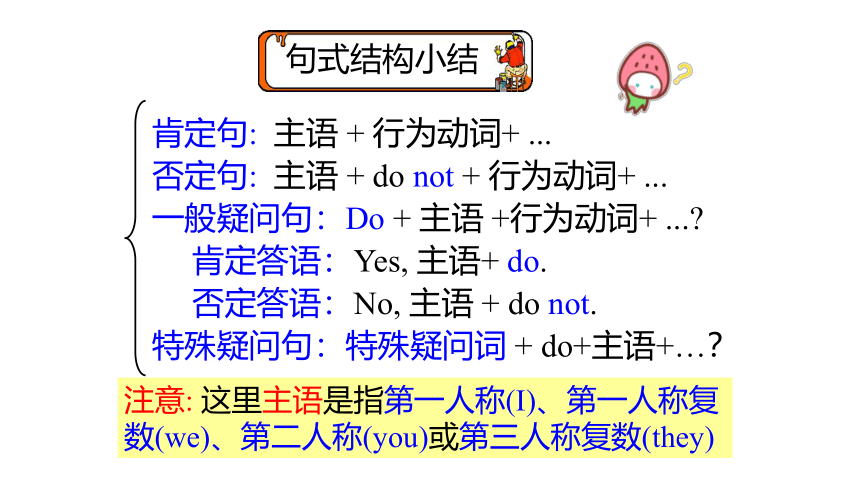
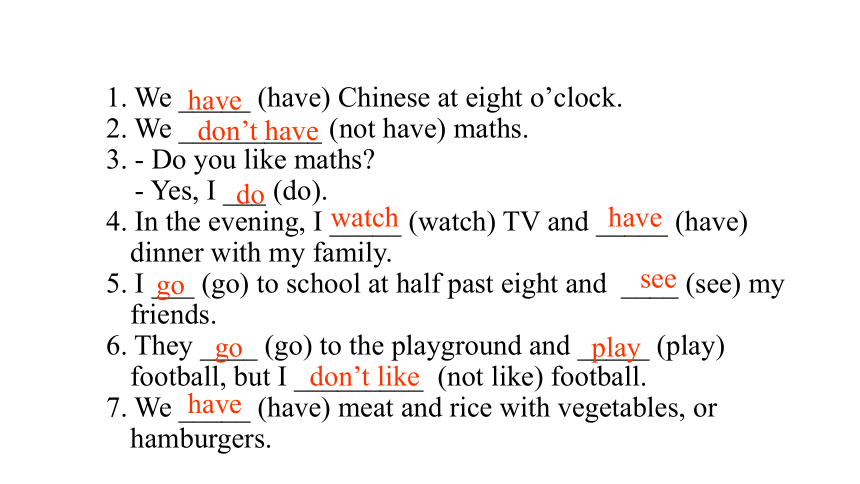
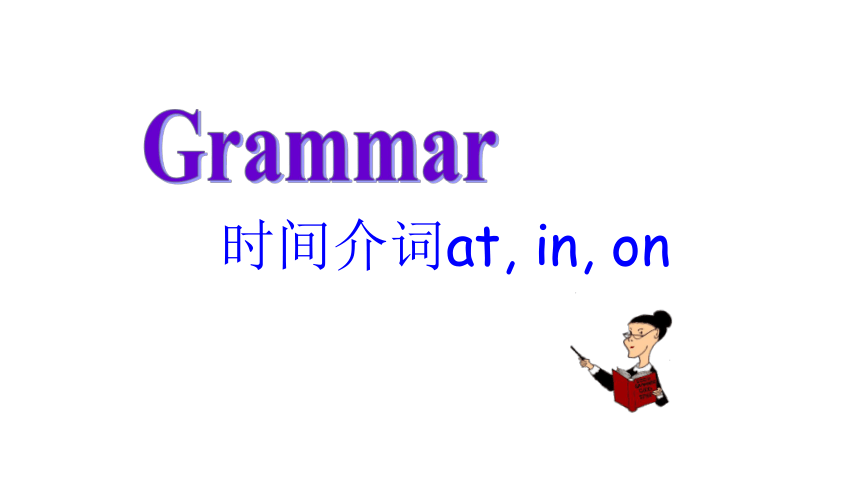
文档简介
(共20张PPT)
Unit 3
Language in use
Module 5
My school day
Grammar
行为动词的一般现在时(I)
Alex starts work at 9:00 every morning.
Cats eat fish.
Alex’s friends like playing football.
When do we use the simple present tense
We use the simple present tense when we talk about:
things that we often do
things that are always true
things that are true now
行为动词的一般现在时
一般现在时表示经常性或习惯性的动作;
也可表示现在存在的状态等。
当主语是第一人称(I)、第一人称复数(we)、第二人称(you)或第三人称复数(they)时,其谓语动词没有形式上的变化;第三人称单数时,谓语动词相应变化。(下一模块讲解第三人称单数的情况)
行为动词的一般现在时肯定句:
主语 + 行为动词+ …
主语 + 助动词do+ not + 行为动词…
行为动词的一般现在时否定句:
行为动词的一般现在时疑问句:
一般疑问句:
助动词do + 主语 + 行为动词+ …
一般疑问句的回答:
肯定回答: Yes, 主语+ do
否定回答: No, 主语+ do not
特殊疑问句:
特殊疑问词 + 一般疑问句 (do +主语+行为动词 +…)
肯定句: 主语 + 行为动词+ ...
否定句: 主语 + do not + 行为动词+ ...
一般疑问句:Do + 主语 +行为动词+ ...
肯定答语:Yes, 主语+ do.
否定答语:No, 主语 + do not.
特殊疑问句:特殊疑问词 + do+主语+…?
句式结构小结
注意: 这里主语是指第一人称(I)、第一人称复数(we)、第二人称(you)或第三人称复数(they)
1. We _____ (have) Chinese at eight o’clock.
2. We __________ (not have) maths.
3. - Do you like maths
- Yes, I ___ (do).
4. In the evening, I _____ (watch) TV and _____ (have) dinner with my family.
5. I ___ (go) to school at half past eight and ____ (see) my friends.
6. They ____ (go) to the playground and _____ (play) football, but I _________ (not like) football.
7. We _____ (have) meat and rice with vegetables, or hamburgers.
have
don’t have
do
watch
have
go
see
go
play
don’t like
have
Grammar
时间介词at, in, on
时间介词(prepositions of time)
时间介词常用来表示时间状语,不同的时间所使用的介词也不相同,最常用的三个时间介词是at, on, in。
at用在某个时刻前
on用于星期或具体某天的上午、下午或晚上前
in 用在某段时间前;
★泛指在上午、下午或晚上;(固定搭配)
★也用在某季节、某周、某月、某年前面。
in / on / at + 时间
ten o’clock
night
noon
the morning
the afternoon
the evening
in
on
Monday
Tuesday morning
a warm morning
1. __
2. ___
3.___
at 表示时间点,具体时刻
in 表时间段,在上午/下午/晚上;在某季节、某周、某月、某年前面
on 表具体在星期、某一天或某一天的上午/下午/晚上
at
Summary
1. We have Chinese ___ eight o’clock.
2. ___ the evening, I watch TV and have dinner with my family.
3. They have art ____ Monday.
4. I go to school ___ half past eight and see my friends.
5. I go to school _____ weekdays, but not ____ Saturday and Sunday.
6. Then we go home ___ half past three.
In
on
at
at
on
on
at
Practice
1. Sorry, I’m late. The first time ___ May.
2. You were late ___ Monday last week.
3. It’s ___ the morning of May 15th .
4. I got up ___ six ___ the morning.
5. I arrived at school ___seven o’clock.
in
on
on
at
in
at
圈出的部分是时间介词,分别为___________.
at
on
in
have lessons
get up very late
see my grandparents
play games with friends
play basketball
read a book
watch TV
do my homework
Pair work
Talk about your activities and the time in the timetable. (P30)
1
A: Do you ... on ...(星期几) ?
B: Yes, I do. / No, I don't. I ...
For example
以下部分为课本练习,供老师在对答案时选择使用。
Match the words in Column A with the words and expressions in Column B. (P30)
A
B
1 have
2 do
3 go
a) dinner
b) your homework
c) to school
d) a break
e) an English lesson
f) to bed
g) home
2
Now talk about your school day.
eg: I go to school at half past seven in the morning.
On Friday I have a busy day. I (1) ______ at half past six in the morning. Then I wash my hands and face, and (2) ____________ at seven. At half past seven, I (3) ___________, and (4) _________ at eight. There are four lessons in the morning. At twenty to ten, we (5) ___________ for twenty minutes. We go to the playground and I talk with my friends. We (6) __________ in the school dining hall. In the afternoon, we have two lessons and go home at half past three. I don’t (7) _____________ on Friday evening. I do it on Saturday.
get up
have breakfast
start work
go to school
have a break
have lunch
do homework
do homework get up go to school
have a break have breakfast
have lunch start work
3
Complete the passage with the expressions from the box. (P30)
Complete the sentences with at, in or on. (P31)
1. We go to school ____ the morning.
2. We don’t go to school ____ Sunday.
3. We don’t have a science lesson ____ Wednesday.
4. I get up ____ seven o’clock.
5. We go home _____ the afternoon.
6. We have dinner _____ half past six.
in
on
on
at
in
at
4
Complete the sentences with the words from the box. (P31)
because break homework interesting subject
1. We have maths after ______ today.
2. I like maths. It’s my favourite _______.
3. Our maths teacher is very good and she makes it __________.
4. I like it ________ it’s interesting.
5. I do my maths _________ first after school every day.
break
subject
interesting
because
homework
5
Homework
Review the grammar we have
learned today.
2. Preview A trip to the zoo on page
36.
Unit 3
Language in use
Module 5
My school day
Grammar
行为动词的一般现在时(I)
Alex starts work at 9:00 every morning.
Cats eat fish.
Alex’s friends like playing football.
When do we use the simple present tense
We use the simple present tense when we talk about:
things that we often do
things that are always true
things that are true now
行为动词的一般现在时
一般现在时表示经常性或习惯性的动作;
也可表示现在存在的状态等。
当主语是第一人称(I)、第一人称复数(we)、第二人称(you)或第三人称复数(they)时,其谓语动词没有形式上的变化;第三人称单数时,谓语动词相应变化。(下一模块讲解第三人称单数的情况)
行为动词的一般现在时肯定句:
主语 + 行为动词+ …
主语 + 助动词do+ not + 行为动词…
行为动词的一般现在时否定句:
行为动词的一般现在时疑问句:
一般疑问句:
助动词do + 主语 + 行为动词+ …
一般疑问句的回答:
肯定回答: Yes, 主语+ do
否定回答: No, 主语+ do not
特殊疑问句:
特殊疑问词 + 一般疑问句 (do +主语+行为动词 +…)
肯定句: 主语 + 行为动词+ ...
否定句: 主语 + do not + 行为动词+ ...
一般疑问句:Do + 主语 +行为动词+ ...
肯定答语:Yes, 主语+ do.
否定答语:No, 主语 + do not.
特殊疑问句:特殊疑问词 + do+主语+…?
句式结构小结
注意: 这里主语是指第一人称(I)、第一人称复数(we)、第二人称(you)或第三人称复数(they)
1. We _____ (have) Chinese at eight o’clock.
2. We __________ (not have) maths.
3. - Do you like maths
- Yes, I ___ (do).
4. In the evening, I _____ (watch) TV and _____ (have) dinner with my family.
5. I ___ (go) to school at half past eight and ____ (see) my friends.
6. They ____ (go) to the playground and _____ (play) football, but I _________ (not like) football.
7. We _____ (have) meat and rice with vegetables, or hamburgers.
have
don’t have
do
watch
have
go
see
go
play
don’t like
have
Grammar
时间介词at, in, on
时间介词(prepositions of time)
时间介词常用来表示时间状语,不同的时间所使用的介词也不相同,最常用的三个时间介词是at, on, in。
at用在某个时刻前
on用于星期或具体某天的上午、下午或晚上前
in 用在某段时间前;
★泛指在上午、下午或晚上;(固定搭配)
★也用在某季节、某周、某月、某年前面。
in / on / at + 时间
ten o’clock
night
noon
the morning
the afternoon
the evening
in
on
Monday
Tuesday morning
a warm morning
1. __
2. ___
3.___
at 表示时间点,具体时刻
in 表时间段,在上午/下午/晚上;在某季节、某周、某月、某年前面
on 表具体在星期、某一天或某一天的上午/下午/晚上
at
Summary
1. We have Chinese ___ eight o’clock.
2. ___ the evening, I watch TV and have dinner with my family.
3. They have art ____ Monday.
4. I go to school ___ half past eight and see my friends.
5. I go to school _____ weekdays, but not ____ Saturday and Sunday.
6. Then we go home ___ half past three.
In
on
at
at
on
on
at
Practice
1. Sorry, I’m late. The first time ___ May.
2. You were late ___ Monday last week.
3. It’s ___ the morning of May 15th .
4. I got up ___ six ___ the morning.
5. I arrived at school ___seven o’clock.
in
on
on
at
in
at
圈出的部分是时间介词,分别为___________.
at
on
in
have lessons
get up very late
see my grandparents
play games with friends
play basketball
read a book
watch TV
do my homework
Pair work
Talk about your activities and the time in the timetable. (P30)
1
A: Do you ... on ...(星期几) ?
B: Yes, I do. / No, I don't. I ...
For example
以下部分为课本练习,供老师在对答案时选择使用。
Match the words in Column A with the words and expressions in Column B. (P30)
A
B
1 have
2 do
3 go
a) dinner
b) your homework
c) to school
d) a break
e) an English lesson
f) to bed
g) home
2
Now talk about your school day.
eg: I go to school at half past seven in the morning.
On Friday I have a busy day. I (1) ______ at half past six in the morning. Then I wash my hands and face, and (2) ____________ at seven. At half past seven, I (3) ___________, and (4) _________ at eight. There are four lessons in the morning. At twenty to ten, we (5) ___________ for twenty minutes. We go to the playground and I talk with my friends. We (6) __________ in the school dining hall. In the afternoon, we have two lessons and go home at half past three. I don’t (7) _____________ on Friday evening. I do it on Saturday.
get up
have breakfast
start work
go to school
have a break
have lunch
do homework
do homework get up go to school
have a break have breakfast
have lunch start work
3
Complete the passage with the expressions from the box. (P30)
Complete the sentences with at, in or on. (P31)
1. We go to school ____ the morning.
2. We don’t go to school ____ Sunday.
3. We don’t have a science lesson ____ Wednesday.
4. I get up ____ seven o’clock.
5. We go home _____ the afternoon.
6. We have dinner _____ half past six.
in
on
on
at
in
at
4
Complete the sentences with the words from the box. (P31)
because break homework interesting subject
1. We have maths after ______ today.
2. I like maths. It’s my favourite _______.
3. Our maths teacher is very good and she makes it __________.
4. I like it ________ it’s interesting.
5. I do my maths _________ first after school every day.
break
subject
interesting
because
homework
5
Homework
Review the grammar we have
learned today.
2. Preview A trip to the zoo on page
36.
同课章节目录
- Starte
- Module 1 My teacher and my friends
- Module 2 My English lesson
- Module 3 My English book
- Module 4 My everyday life
- Module 1 My classmates
- Unit 1 Nice to meet you.
- Unit 2 I'm Wang Lingling and I'm thirteen years ol
- Unit 3 Language in use.
- Module 2 My family
- Unit 1 Is this your mum?
- Unit 2 These are my parents.
- Unit 3 Language in use.
- Module 3 My school
- Unit 1 There are thirty students in my class.
- Unit 2 The library is on the left of the playgroun
- Unit 3 Language in use.
- Module 4 Healthy food
- Unit 1 We've got lots of apples.
- Unit 2 Is your food and drink healthy?
- Unit 3 Language in use.
- Module 5 My school day
- Unit 1 I love history.
- Unit 2 We start work at nine o'clock.
- Unit 3 Language in use.
- Revision module A
- Module 6 A trip to the zoo
- Unit 1 Does it eat meat?
- Unit 2 The tiger lives in Asia.
- Unit 3 Language in use.
- Module 7 Computers
- Unit 1 How do I write my homework on the computer?
- Unit 2 When do you use a computer?
- Unit 3 Language in use.
- Module 8 Choosing presents
- Unit 1 I always like birthday parties.
- Unit 2 She often goes to concerts.
- Unit 3 Language in use.
- Module 9 People and places
- Unit 1 We're enjoying the school trip a lot.
- Unit 2 They're waiting for buses or trains.
- Unit 3 Language in use.
- Module 10 Spring Festival
- Unit 1 Are you getting ready for Spring Festival?
- Unit 2 My mother's cleaning our houses and sweepin
- Unit 3 Language in use.
- Revision module B
